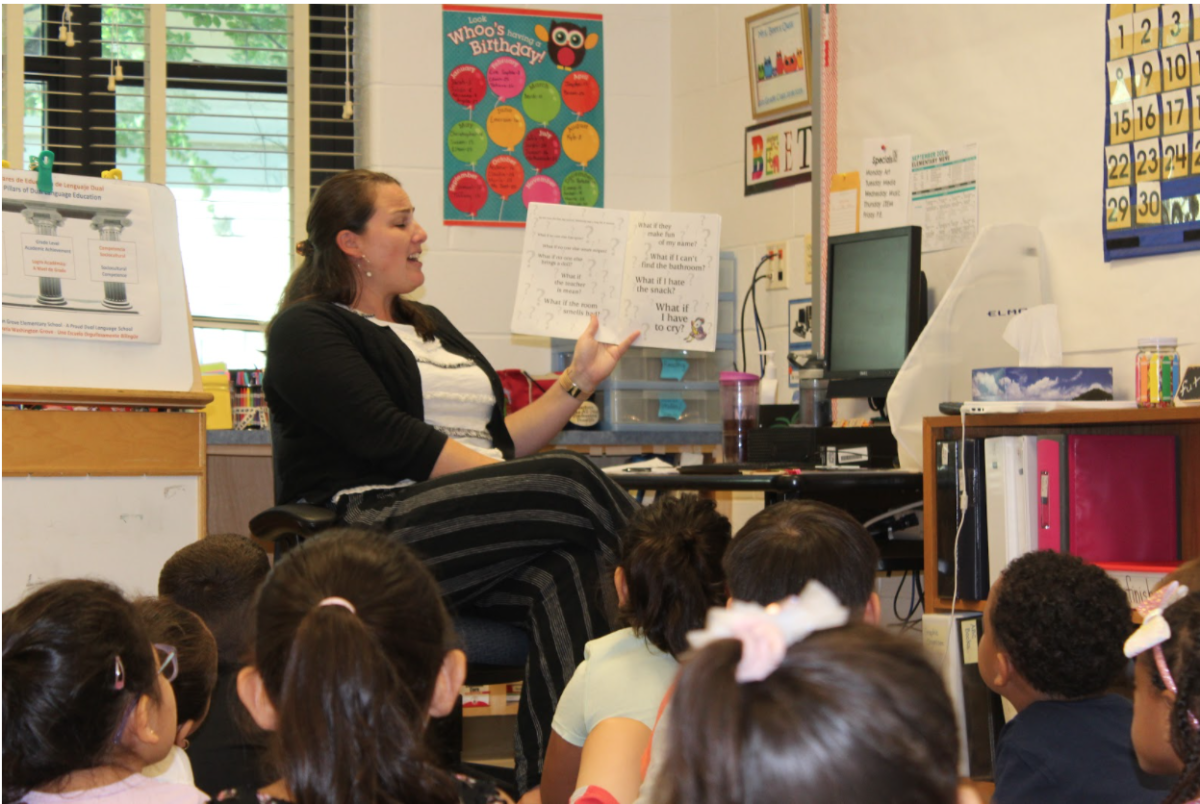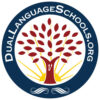January Dual Language Teacher of the Month


It is our pleasure to award Deirdre Beet, a teacher at MCPS- Washington Grove Elementary School, the January Dual Language Teacher of the Month award. Ms. Beet started teaching 16 years ago, beginning with kindergarten for twelve years and first grade for four years. Before full time teaching, she was a long-term substitute as well as a before and after school teacher for four years. Three years ago, she became a Dual Language teacher that facilitates in English and an emergent bilingual. Her current school transitioned to a Dual Language School four years ago and she was part of the process from the beginning.
I believe what makes my classroom stand out is my willingness to try new things. Dual language was new to me, but I jumped right in. I tried new dual language strategies, incorporated the 3 pillars and the language domains, and tested translanguaging lessons. In addition, I write and post my content objectives, language objectives, and cultural objectives daily for my students to take ownership of their learning. They can tell everyone what the objectives are, what language domains we will use to do that objective, and why we do it. I also integrate social justice through the children’s books we read in my classroom. It is important in my classroom to be open-minded and uplift other cultures, races, genders, and everything that makes us who we are.
Ms. Beet’s biggest influence in becoming a teacher was her experience in school, along with her family. Her experience in elementary school was very difficult; she saw how hard teachers worked with her to understand difficult concepts. However, she also saw how she wanted to treat students differently, with more compassion and patience. Her family instilled an emphasis on education and how it makes pathways to success in life.
Four years ago, Ms. Beet learned about Dual Language Schools. She was blown away by Dr. José Medina and the research he showed her. From that point on, she was completely in love with dual language because it celebrates everything we know and puts it to use in all of the languages we know.
Ms. Beet started her teaching career in Prince George’s County, MD. After a few years at one school, she moved to another district in Frederick County, MD. Five years later, she moved to Montgomery County, MD and was immediately hired at Washington Grove Elementary School. During her first year there, they made the decision to make their school a Dual Language School! She was not fortunate enough to teach a dual language grade level until the second year it was implemented. This is her third year as a dual language teacher. Now that she is a dual language teacher, she cannot imagine going back to a monolingual classroom because she has seen the overwhelming benefits to dual language education!
My favorite part of teaching is seeing the children! I love coming into the classroom (or opening my Zoom room) and seeing their excited faces! When they share stories about what they did the day before or former students come back to visit, it brings a smile to my face and warms my heart and I know I am doing what I am supposed to in this life. I love watching my students learn and experience new ideas within our classroom especially when they make metalinguistic connections. For example, we celebrate the Day of the Dead to honor loved ones and family members. Students get excited to share how their family celebrates their loved ones and family members. Every student had the opportunity to bring in a picture and share in English or Spanish a story or memory of their loved one. After this, I felt I knew my students better and on a deeper level.
Another thing she loves about teaching is when they figure something out or have productive struggle. She feels so proud of her students when they are making connections especially between the languages or between their lives and the lives of others. Moreover, she loves learning from her students. They teach her about their languages and cultures. They learn a lot together!
Ms. Beet prioritizes communication in the classroom! While strengthening their classroom relationships, they talk about what they do at home or on the weekends. She has attended dance recitals and sports games for her students to show them that she cares about them and their interests outside of school. She encourages her students to use all of their languages wherever they go. In the past, she has had families share that their child was able to translate for them while out in the community. Those experiences have changed many of their families’ views on the benefits of dual language education.
Ms. Beet describes her school leadership as a positive role model to her students as well as her teammates. She advocates for the needs and rights of her students and their families, her teammates, and the guiding principles of dual language education. The third word she would use to describe her leadership is a life-long learner. She attends conferences and professional development opportunities to continue to develop her skills as a dual language educator and leader.
She would describe her students as eager, caring, and persistent. They come into class every day ready to learn; they’re excited to find out what they are going to learn that day. They genuinely care about each other and for others in our community. If someone is out, they will ask when they return if they’re feeling better. They will help each other out when someone is stuck on a concept. For their community, they talk a lot about the 3rd pillar of dual language- sociocultural competence. They show they care about everyone’s culture, race, gender, and ensuring to say everyone’s name correctly. Persistence is something that her students have learned a lot this year. With all of the new technology they use during virtual schooling, they have had to be persistent! Her students raise their hands to take risks and challenge themselves. They know that when they struggle, it is because they are learning!
Biliteracy, to me, does not just mean reading and writing in two languages. It means having an opportunity to be successful in life. Having the ability to speak, listen, read, and write fluently in two (or more) languages is an amazing asset that my students have the opportunity to take advantage of. Biliteracy also means making metalinguistic connections. In my class, we learn that what you learn in one language can transfer over to another language. We use Bridges to make connections as well as cognate charts and translanguaging lessons. Biliteracy is elevating a once-marginalized language back to its rightful status. I have students speak in both languages, use translanguaging moments daily, and protect their Spanish language time. If we have a change in the schedule, I make sure that we adjust our times so all of our students can have access to both languages daily.
To ensure her students understand the value of biliteracy, they discuss the three pillars of dual language learning daily. They discuss what each pillar means and how they can use their language domains to accomplish that pillar in their lessons for the day. They discuss how being bilingual and biliterate is an awesome attribute to have as they grow up.
Their second pillar is grade level academic achievement, which they describe as all of the first graders in the county are doing the same thing they are, but they are doing it in two languages. They focus on the fact that they are learning the same objectives, skills, and concepts in two languages! Moreover, she finds many opportunities where they teach her Spanish! As an emergent bilingual, she makes sure that her students know that they are teaching her Spanish and that because they are bilingual or multilingual, they will have more opportunities as an adult than she does.
In the future, she sees her students making a difference in the world. Being bilingual they will be able to reach more people and communicate with many more people. She hopes that they continue to learn and perfect their languages (or learn more) to help show everyone how important it is to embrace different languages and cultures.
My hope is that my students first and foremost remember that learning is fun and life-long. I hope my students continue to be bilingual and help others become bilingual as well. My hope is that my students will affect our community and world positively, to have compassion and cohesiveness towards all humankind.


That’s wonderful! Maybe one day I can participate in this process as a bilingual Portuguese teacher too.